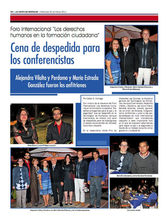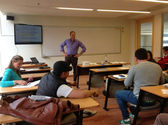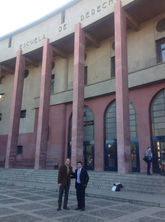_edited.png)
Una red de investigación
sobre Instituciones Públicas y promoción de la Justicia incluyente y los DDHH


+ de 50 Académicos expertos colaborando a través América
En diálogo con distintos actores jurídicos, generando evidencia, conocimientos y práctica, mediante la investigación multidisciplinaria y empírica.
Creando literatura, conferencias y seminarios
Investigadores y Actores judiciales promoviendo temas e intercambio de conocimiento para un cambio de cultura jurídica.
Conferencia / Capacitación
"Una mirada transversal sobre el principio de legitimidad en el marco de las reformas jurídicas latinoamericanas"

Académicos y miembros del poder judicial de México, Chile y Canadá, discuten los desafíos de implementar estándares internacionales de DDHH en nuestros sistemas de justicia. Sobre la base de las experiencias y decisiones de los tribunales, la discusión aborda la cuestión de las barreras o limitaciones que afectan a nuestros sistemas judiciales, particularmente con respecto a las poblaciones vulnerables, debido a estereotipos sociales, culturales, raciales, sociales, de género u otros estereotipos.
Seminario
"Acceso a la Justicia y Legitimidad
en los espacios judiciales"

Expertos del Norte y del Sur discutieron sus investigaciones y experiencias centrados en diferentes contextos de Canadá y América Latina. Se exploró cómo la justicia respondía a diversos intereses fuera del sistema legal y que agravaban las desigualdades. El objetivo de este seminario fue identificar estos fenómenos y buscar medios y estrategias para enfrentarlos.

Origen de la Plataforma
Tanto América Latina como Canadá, adhirieron en las últimas décadas
en nuevos cambios constitucionales y legales creando nuevos mecanismos de garantía de los derechos fundamentales.
A pesar de estos cambios institucionales y legislativos innovadores, aún falta representación por las instituciones públicas, agudizando la ausencia de legitimidad.
Asimismo, el acceso a la justicia de las personas en situación de vulnerabilidad en el hemisferio continúa siendo un desafío pendiente, como también la mejora de las condiciones sociales de dichos grupos.
Estas deficiencias, suceden incluso en países que exhiben los mejores estándares de protección de los derechos humanos en el continente. Estudios recientes en Canadá, por ejemplo, muestran el trato discriminatorio hacia poblaciones desfavorecidas, basado en perfiles policiales (Dufour, PUM 2022), como una aplicación diferenciada del derecho punitivo a los más vulnerables (Sylvestre, Cambridge 2021, Lamarche, UQUAM 2016).
Por todas las razones anteriores, creemos que es especialmente oportuno y tal vez urgente que a medida que los países de las Américas implementan y rediseñan sus reformas legales e innovan en sus sistemas legales y judiciales, intercambiemos y comparemos nuestras experiencias y datos. El objetivo principal de la plataforma es desarrollar líneas de investigación y deliberación que incidan en la realidad y contribuyan a mejorar la institucionalidad democrática y la vigencia de los derechos human
Por un intercambio
de experiencias y conocimiento
La Misión
La Plataforma se enfoca principalmente en el pensamiento jurídico y político, las prácticas institucionales de las instancias gubernamentales y organizaciones de la sociedad civil con el fin de intercambiar y producir conocimientos y buenas prácticas en las Américas, promover la pertinencia, integridad y democratización de las instituciones públicas, así como la protección y el respeto de los derechos humanos de la persona, poniendo especial énfasis en los segmentos de la población que requiere especial protección y educar a la población contribuyendo a la integración de estos conocimientos en la producción y formación profesional de los diferentes países.
La Visión
Ser un referente a nivel interamericano en la producción de conocimientos, intercambio y difusión de diversas ideas, buenas prácticas y diálogos interculturales con relación a los sistemas de justicia y la defensa y promoción de los derechos humanos, generando propuestas pertinentes, ampliamente difundidas y discutidas en los ámbitos políticos, sociales y jurídicos de los países del continente.
Nuestros 5 Objetivos
Objetivos específicos
1. Desarrollar amplios debates y análisis críticos, a partir de la valoración de las diferencias y diversidades propias de la Región.
2. Investigar las diferentes problemáticas y desafíos relativos a las instituciones públicas del continente y la vigencia de los derechos humanos, basados en la realidad social y política de los países cuyas instituciones integran la Plataforma.
3. Desarrollar actividades de formación e intercambio de conocimientos y experiencias con personas expertas, actores legales y judiciales, organizaciones de la sociedad civil y comunidad en general.
4. Capacitar a la comunidad educativa, en especial a los estudiantes sobre los desafíos comunes que se presentan en las Américas en especial en el ámbito de la Justicia.
5. Contribuir con los productos generados por los integrantes de la Plataforma al debate y deliberación pública sobre la Justicia y los derechos humanos conforme a los discursos contemporáneos en la búsqueda de propuestas que ayuden a superar los problemas comunes identificados en las Américas.
Encuentros & Colaboraciones
Partners & Alianzas

Dado este trabajo en conjunto, los convenios vigentes entre varias de estas instituciones universitarias y las relaciones afiliadas entre sus miembros, es que nace la decisión de afianzar el trabajo realizado y proyectarlo a futuro, con la creación formal de la Plataforma Justicia y Democracia en las Américas (PJUSDA). Así, se busca proyectar la creación de una entidad dotada de personalidad jurídica en uno o más de los países concernidos y, por su intermedio, postular a distintas iniciativas de interés, consolidando y proyectando el trabajo que hemos venido cumpliendo.










Testimonios

Olga García López
Presidenta del Supremo Tribunal de Justicia y del Consejo de la Judicatura del Poder Judicial
Estado San Luis Potosí
- México _
El Poder Judicial del Estado de San Luis Potosí, agradece la distinción que le hizo la Universidad de Ottawa, a través del Investigador y Coordinador de Proyectos, Pierre Gilles, a la capacitación “Una mirada transversal sobre el principio de legitimidad” del orden jurídico en Latinoamérica; el cual superó toda expectativa, al lograr el intercambio de experiencias entre Poderes Judiciales y la Comunidad Académica, de Canadá, Chile y nuestro País; con quienes compartimos las acciones de este Tribunal en temas sobre personas o grupos en situación de vulnerabilidad y la capacitación constante en Género y Derechos Humanos para robustecer el conocimiento de las obligaciones del Estado Mexicano en la aplicación del derecho internacional, paralelamente a las decisiones de la Suprema Corte de Justicia de la Nación.

Elsa Cordero
Magistrada en Retiro del Poder Judicial
Estado de Tlaxcala
- México -
La Capacitación ¨Una mirada transversal sobre el principio del legitimidad en el marco de las reformas¨ , es una experiencia académica que desarrolla el vínculo entre la teoría y la práctica judicial, enriquecido con las visiones de distintas experiencias nacionales que no solo orientan -o previenen en algunos casos-, sino animan a promover nuevos modelos, prácticas y sistemas. El diálogo, la crítica, la construcción y el intercambio de ideas hacen de este seminario un opción altamente recomendable.

Vania Bouteaud
Jueza de Garantía
Santiago
- Chile -
Fue una experiencia muy valiosa contribuir en este Proyecto de Capacitación que aunó la participación tanto de académicos como de operadores de justicia. Actividad organizada en forma conjunta por la Oficina de Investigación de la Universidad de Ottawa, la Facultad de Derecho y Humanidades de la Universidad Central de Chile y la Facultad de Derecho de la Universidad de Chile.
Durante los días 27 y 28 de abril de 2021 una serie de profesionales del derecho de México, Canadá y Chile abordamos tópicos relacionados a la legitimidad de los poderes judiciales; y en lo personal, la temática vinculada a los procedimientos penales que involucran a personas con discapacidad cognitiva, tanto víctimas como imputados.

Andrés Arcuch
Corte Suprema
Santiago
- Chile -
Participar en esta actividad fue una experiencia tremendamente valiosa en lo profesional y humano. Fue muy grato poder compartir los avances en materia de inclusión y mejora de acceso para las personas con discapacidad. Así mismo, muy enriquecedor escuchar las experiencias de otras instituciones y servicios públicos de Chile y Canadá. El valor de este tipo de iniciativas está en la participación de todas las personas que se vinculan en la materia y que desean un mejor Estado y un mejor país.

Dr. Arturo Argente
Profesor en Derecho
Toluca
- México -
La plataforma académica, que se encuentra conformada por varios académicos alrededor del continente americano y que provienen de diferentes universidades de reconocimiento mundial, ofrece un profundo análisis sobre los retos que enfrentan los derechos humanos y su respectivo desarrollo en esta región del mundo.
Los desafíos que enfrenta el continente americano en materia de derechos humanos derivados de la pandemia por el COVID-19, la violencia contra las mujeres, la atención a las familias de las personas desaparecidas, migración y el abandono a los grupos vulnerables que integran esta zona del mundo reclaman la atención, no sólo de los diversos gobiernos y organismos defensores de derechos humanos que conforman esta zona, especialmente de la academia que necesita formular mesas de análisis, debates y provocar propuestas apegadas al derecho y que causen un impacto en los ámbitos políticos, sociales y jurídicos de los países del continente. Al final son respuestas que exige el pueblo latinoamericano.
















